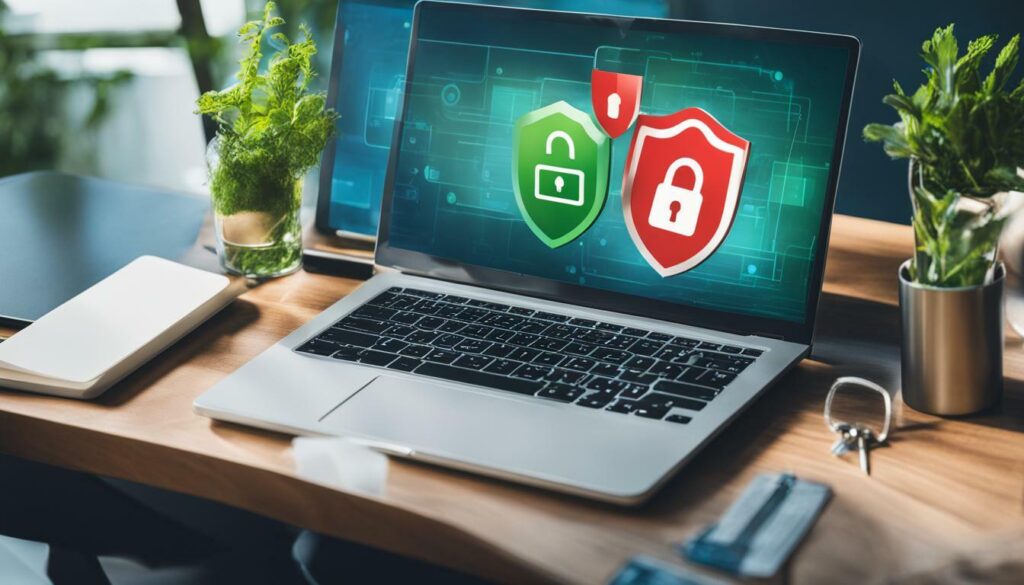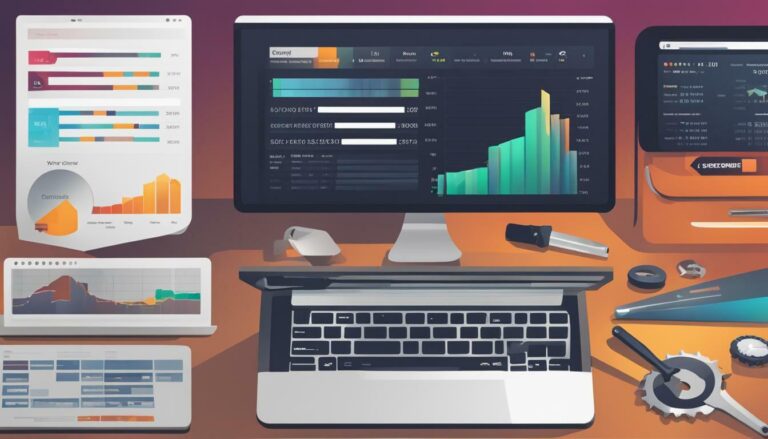Essential Credit Repair Considerations for Remote Workers

As a remote worker, you must be aware of the essential credit repair considerations to ensure your financial health remains strong. Maintaining a good credit score is crucial for your overall financial well-being, and remote work presents unique challenges and opportunities in this regard.
Remote work credit repair tips can help you navigate the complexities of credit repair while working remotely. Whether you’re a freelancer, independent contractor, or remote employee, it’s important to understand the strategies and approaches that can help you improve your credit.
Credit repair companies can be valuable partners in your credit repair journey. They can assist you in reviewing your credit reports, disputing inaccuracies, and negotiating with creditors on your behalf. However, choosing the right credit repair company is crucial.
Researching their reputation, examining their service agreement, considering pricing and services, checking for credentials and accreditations, and understanding their dispute process and customer support are essential factors to consider when selecting a credit repair company.
Moreover, it’s important to be aware of the benefits and challenges of remote work. While it offers increased productivity and access to a wider talent pool, remote work can also present difficulties in collaboration, technology issues, and limited team-building opportunities.
🚨 TUIC Errors + Low Credit Score?
CreditScoreIQ helps you build credit faster by reporting utility bills to all 3 bureaus—while you dispute errors.
Start Building Credit Today →Ensuring remote work security is another critical aspect to consider. By keeping an up-to-date inventory of your devices, implementing password restrictions, and using secure networks, you can protect your sensitive information. Establishing a strong remote security policy with measures like cloud migration, VPN connections, multi-factor authentication, and password managers is also essential.
Finally, training yourself on best practices for remote work is vital to maintain both productivity and security. Regularly running software updates, securing video meetings, being cautious of email phishing, creating strong passwords, and using caution when connecting to wireless networks are all important steps to take.
Key Takeaways
- Remote workers must consider essential credit repair considerations to maintain a solid credit score.
- Credit repair companies can help fix errors in credit reports and negotiate with creditors.
- Researching credit repair companies and understanding their services and credentials is important when choosing one.
- Remote work offers benefits like increased productivity but also challenges like collaboration difficulties.
- Ensuring remote work security through various measures is crucial for data protection.
Understanding Credit Repair for Remote Workers
To effectively repair your credit while working remotely, it is crucial to understand the strategies and approaches available to remote professionals like yourself. Remote work offers unique challenges and opportunities when it comes to maintaining a healthy credit score. By taking proactive steps, you can improve your credit and set yourself up for financial success.
One key strategy is to work with credit repair companies. These companies specialize in reviewing credit reports, identifying errors, disputing inaccurate information, and negotiating with creditors on your behalf. They have the expertise and resources to navigate the credit repair process effectively.
When choosing a credit repair company, it’s important to do your research. Look for a reputable company with a proven track record of success. Examine their service agreement carefully to understand the scope of their services, fees, and any guarantees they offer. Check for credentials and accreditations to ensure they operate within industry standards. Additionally, inquire about their dispute process and customer support to ensure they provide the level of service you require.
While credit repair companies can be valuable partners, it’s essential to supplement their efforts with responsible financial habits. Monitor your credit regularly, review your credit reports for any errors, and address them promptly. Pay your bills on time, keep your credit utilization low, and avoid taking on unnecessary debt. These habits, combined with the assistance of a credit repair company, can help you improve your credit and achieve your financial goals.

Remember, repairing your credit while working remotely requires a holistic approach. By understanding the strategies and approaches available to you, working with credit repair companies, and practicing responsible financial habits, you can take control of your credit and set yourself up for long-term success.
Choosing the Right Credit Repair Company
When choosing a credit repair company, it’s important to conduct thorough research and evaluate various factors to ensure you make an informed decision. Repairing your credit is a critical process that requires the expertise and credibility of a reputable company. To assist you in your search, consider the following key considerations:
- Reputation: Take the time to research the reputation of each credit repair company you are considering. Look for customer reviews and testimonials, and check if there have been any complaints or legal actions against them. A well-established company with a positive track record is more likely to provide reliable and effective services.
- Service Agreement: Before committing to a credit repair company, carefully examine their service agreement. Ensure that you understand the terms and conditions, including the scope of services they will provide, the duration of the agreement, and any fees or pricing structures involved. It’s essential to have a clear understanding of what you’re signing up for.
- Pricing and Services: Compare the pricing and services offered by different credit repair companies. While cost is a factor to consider, it should not be the sole determinant. Look for companies that offer a comprehensive range of services tailored to your specific credit repair needs.
- Credentials and Accreditations: Check if the credit repair company has any relevant credentials or accreditations. Look for certifications or affiliations with reputable industry organizations, as this demonstrates their commitment to professional standards and best practices.
- Dispute Process and Customer Support: Inquire about the credit repair company’s dispute process and how they handle customer support. A well-defined dispute process will ensure that inaccuracies on your credit report are addressed promptly. Additionally, responsive and helpful customer support is crucial during your credit repair journey.

By considering these factors and conducting diligent research, you can choose a credit repair company that meets your specific needs and helps you achieve your financial goals. Remember, repairing your credit is a step towards a more secure financial future, and selecting the right company to guide you through the process is an important decision.
Remote Work Benefits and Challenges
Remote work offers numerous benefits and opportunities, but it also presents its own set of challenges that you should be aware of as a remote worker. One of the key advantages of remote work is the potential for increased productivity. Without the distractions and interruptions of a traditional office environment, you can often accomplish more in less time. This flexibility allows you to manage your workload more efficiently and achieve a better work-life balance.
Another advantage of remote work is access to a wider talent pool. As a remote worker, you are not limited by geographic location when it comes to collaborating with colleagues or finding job opportunities. This opens up new possibilities for networking, knowledge sharing, and career advancement.
However, remote work also comes with its challenges. Difficulties in collaboration can arise when communication and coordination become more complex without face-to-face interaction. Technology issues can also be a hindrance, as remote workers rely heavily on reliable internet connections, video conferencing platforms, and other digital tools for seamless communication and workflow. Additionally, limited team-building opportunities can make it challenging to develop strong relationships and foster a sense of camaraderie within virtual teams.
The benefits and challenges of remote work:
- Increased productivity
- Access to a wider talent pool
- Difficulties in collaboration
- Technology issues
- Limited team-building opportunities

| Benefits of Remote Work | Challenges of Remote Work |
|---|---|
| Increased productivity | Difficulties in collaboration |
| Access to a wider talent pool | Technology issues |
| Limited team-building opportunities |
Ensuring Remote Work Security
Maintaining a secure work environment is crucial for remote workers, and implementing proper security measures is essential to protect your personal and professional information. As a remote worker, you need to be proactive in safeguarding your devices, networks, and data from potential threats. Here are some remote work security tips to help you establish a strong foundation of security:
- Keep an up-to-date inventory of your devices: Regularly update the software and firmware on all your devices, including laptops, smartphones, and routers. This ensures that you have the latest security patches and protection against vulnerabilities.
- Implement password restrictions: Use strong, unique passwords for each of your accounts and devices. Consider using a password manager to securely store and manage your passwords.
- Guard against phishing scams: Be cautious when clicking on links or opening attachments in emails, especially if they seem suspicious or unfamiliar. Verify the legitimacy of the email sender before sharing any sensitive information.
It is also important to secure your personal devices and networks:
- Use secure personal devices: Ensure that your devices are equipped with reliable security features such as biometric authentication, encryption, and remote wipe capabilities in case of loss or theft.
- Establish a strong remote security policy: Develop clear guidelines and protocols for remote work, including expectations for password complexity, software updates, data backups, and the use of VPN connections for secure access to company resources.
Cloud migration and VPN connections
Migrating your data and applications to cloud-based platforms can offer enhanced security and accessibility, allowing you to work remotely without compromising sensitive information. Additionally, using a virtual private network (VPN) creates a secure and encrypted connection between your device and the internet, protecting your online activities from potential threats.
Remember that implementing multi-factor authentication adds an extra layer of security by requiring additional verification steps, such as a one-time access code sent to your mobile device, when logging into your accounts. By adopting these remote work security tips and best practices, you can minimize the risks and protect your personal and professional information.

As a remote worker, it is important to be knowledgeable about best practices to maintain the security of your online activities and protect sensitive information. By following these remote work best practices, you can minimize the risk of data breaches and ensure a safe and productive work environment.
1. Regularly run software updates:
Keeping your operating system, applications, and antivirus software up to date is crucial for maintaining strong cybersecurity. Regular software updates often include important security patches that address vulnerabilities and protect against emerging threats. Set your devices to automatically install updates or regularly check for updates manually to stay protected.
2. Secure video meetings:
Video conferencing has become an essential part of remote work, but it’s important to ensure the security of these virtual meetings. Use platforms with end-to-end encryption and password protection. Avoid sharing meeting links or IDs on public platforms. Additionally, set up a waiting room feature to verify participants before granting access to the meeting room.
3. Watch out for email phishing:
Email phishing is a common method used by cyber criminals to gain access to sensitive information. Be cautious of unsolicited emails, especially those asking for personal or financial information. Avoid clicking on suspicious links or downloading attachments from unknown sources. Always verify the legitimacy of the email and sender before providing any sensitive data.
4. Create strong passwords:
Strong and unique passwords are essential for protecting your accounts from unauthorized access. Use a combination of uppercase and lowercase letters, numbers, and special characters. Avoid using easily guessable information like birthdays or names. Consider using a password manager to securely store and generate complex passwords for all your accounts.
5. Use caution with wireless networks:
When working remotely, you may need to connect to public Wi-Fi networks, such as those in cafes or airports. However, these networks can be vulnerable to hackers. Whenever possible, use a virtual private network (VPN) to encrypt your internet connection and protect your data. If a VPN is not available, avoid accessing sensitive information or logging into accounts that contain personal or financial data while connected to public Wi-Fi.

By following these remote work best practices, you can ensure the security of your online activities and protect yourself from potential cyber threats. Stay vigilant, stay informed, and prioritize cybersecurity to maintain a safe and productive remote work environment.
Conclusion
By considering these essential credit repair strategies and implementing robust security measures, you can optimize your financial health and ensure your credit score remains strong while working remotely.
Remote workers face unique challenges when it comes to credit repair, but with the right approach, it is possible to overcome them. Working with credit repair companies can be a valuable resource, as they can help review your credit reports, dispute inaccuracies, and negotiate with creditors on your behalf.
When selecting a credit repair company, it is crucial to conduct thorough research. Look into their reputation, carefully examine their service agreement, consider their pricing and services offered, and check for any relevant credentials and accreditations. Additionally, inquire about their dispute process and customer support, ensuring they have the necessary expertise and support to assist you effectively.
Furthermore, remote workers should be aware of the benefits and challenges that come with working remotely. While remote work offers advantages like increased productivity and access to a wider talent pool, it can also present difficulties in collaboration, technology issues, and limited team-building opportunities.
To maintain security while working remotely, it is important to take proactive measures. Keep an up-to-date inventory of your devices, implement password restrictions to protect sensitive information, stay vigilant against phishing scams, and use secure personal devices and networks. Establishing a strong remote security policy, including measures like cloud migration, VPN connections, multi-factor authentication, and password managers, can further enhance your protection.
Lastly, training remote employees on best practices is crucial for maintaining online security. Regularly running software updates, securing video meetings, being cautious of email phishing attempts, creating strong passwords, and exercising caution when connecting to wireless networks are all important steps to safeguard your digital assets.
FAQ
Q: What are essential credit repair considerations for remote workers?
A: Remote workers should be aware of the credit repair process and the benefits of working with credit repair companies. They should also understand how to address credit report errors, negotiate with creditors, and maintain a healthy credit score while working remotely.
Q: How can credit repair companies help remote workers?
A: Credit repair companies can assist remote workers in fixing errors in their credit reports by reviewing them, disputing inaccuracies, and negotiating with creditors. They provide expertise and guidance throughout the credit repair process.
Q: What should remote workers consider when choosing a credit repair company?
A: Remote workers should research the reputation of credit repair companies, thoroughly examine their service agreements, consider pricing and services offered, check for credentials and accreditations, and inquire about their dispute process and customer support.
Q: What are the benefits and challenges of remote work?
A: Remote work offers benefits such as increased productivity and access to a wider talent pool. However, it also presents challenges such as difficulties in collaboration, technology issues, and fewer team-building opportunities.
Q: How can remote workers ensure security while working remotely?
A: Remote workers can keep an up-to-date inventory of devices, implement password restrictions, guard against phishing scams, use secure personal devices and networks, and establish a strong remote security policy with measures like cloud migration, VPN connections, multi-factor authentication, and password managers.
Q: What training and best practices are recommended for remote employees?
A: Remote employees should regularly run software updates, secure video meetings, be cautious of email phishing attempts, create strong passwords, and use caution when connecting to wireless networks.
Ready to Improve Your Credit?
Disputing TUIC errors is step one. Step two? Boost your score by reporting utility payments with CreditScoreIQ.
Get Started Now (Only $1 Trial) →3-bureau reporting • $1M identity insurance • Dark web monitoring




